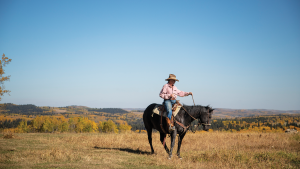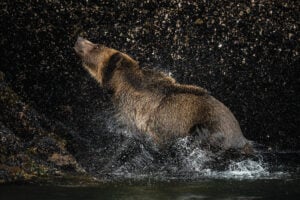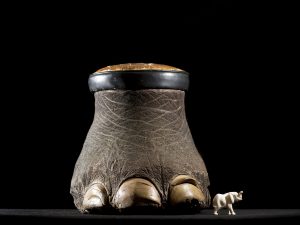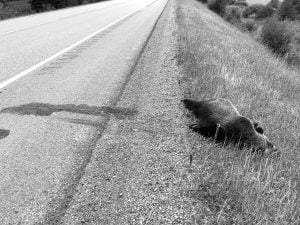As spring finally settles over Canada, grizzly bears have shaken off the effects of their long hibernation and started to roam. But in Alberta, a province that last year saw 31 of the threatened species killed — twice as many as in 2012 and the most in at least 10 years — that wandering spells trouble, especially if it involves getting close to roads.
But according to Gordon Stenhouse, the grizzly bear program leader at the Foothills Research Institute, there may be a way to restore the animals population in Alberta: close roads or minimize their use.
The idea isn’t a new one, and has worked before. “Yellowstone National Park closed roads because grizzly bears were declared an endangered species in the United States,” Stenhouse says, adding that the grizzly population there rebounded after motorized access to roads was denied. “They found the same connection between roads and mortalities.”
Stenhouse’s latest research shows that an average road density of 0.85 kilometres per square kilometre of grizzly habitat results in declining grizzly populations. Because the roads in Alberta’s grizzly country are generally small and typically used by those involved in resource development, a possible solution is closing the roads to all motorized vehicles except those that need to use them.
Despite road density being a key factor of grizzly survival, it’s not accidents that are responsible for the majority of bear deaths — it’s poachers. Poaching accounted for 11 of last year’s grizzly deaths. “The problem is roads bring in people who maybe have a different approach to or vision of wildlife and conservation,” Stenhouse says. “Unfortunately there are poachers that come with those roads, and that’s how bears die.”
Stenhouse doesn’t think closing the roads is an option yet, but he is hopeful that attitudes towards grizzlies may be changing. Alberta suspended its grizzly bear hunt in 2006, and in December 2013, for the first time in the province’s history, a poacher was convicted under the wildlife act and sentenced to jail time and a $10,000 fine.
An Alberta Environment and Sustainable Resource Development spokesperson said in an email that the province has met with key stakeholders and that an updated version of its grizzly bear recovery strategy should be published later this spring.
Meanwhile, Stenhouse says that apart from roads, educating people about the value of grizzlies is critical to ending poaching and securing the future of the bears. “People need to know it’s not acceptable to be killing bears in this way. People need to realize they’re of value not just to Albertans, but to Canadians.”




